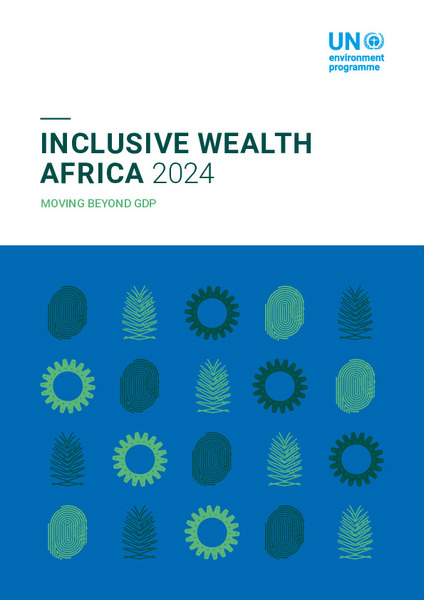| dc.contributor | Ecosystems Division | en_US |
| dc.contributor.author | United Nations Environment Programme | en_US |
| dc.contributor.other | Managi, Shunsuke | en_US |
| dc.contributor.other | Coulibaly, Thierry Yerema | en_US |
| dc.contributor.other | Chen, Shuning | en_US |
| dc.contributor.other | Islam, Moinul | en_US |
| dc.contributor.other | Kumar, Pushpam | en_US |
| dc.coverage.spatial | Africa | en_US |
| dc.date.accessioned | 2023-10-13T17:36:37Z | |
| dc.date.available | 2023-10-13T17:36:37Z | |
| dc.date.issued | 2023-10 | |
| dc.identifier.isbn | 978-92-807-4073-8 | en_US |
| dc.identifier.other | DEP/2572/NA | en_US |
| dc.identifier.uri | https://wedocs.unep.org/20.500.11822/43651 | |
| dc.description | IWR Africa 2023 presents three key messages:
• The renewable natural capital of African countries is in historic decline and there is no room for its mismanagement. A significant proportion of the African population relies on renewable natural capital for their economic activities. Leaders and decision makers must implement policies to actively restore degraded land to ensure the continent’s sustainable development.
• African demographic growth is outpacing increases in Inclusive Wealth. To address this, policymakers must facilitate greater investment in the continent, particularly in education, health, produced capital and nature. Security issues should also be prioritised, as countries faced with these challenges lag in wealth investment.
• The African agricultural sector is marked by inequalities, particularly for women, arising from the sector’s low incomes, and is linked to the decreasing availability of nature and agricultural yields. Policies aimed at reducing discrimination against low-income female farmers will be key to addressing these challenges. | en_US |
| dc.format | pdf | en_US |
| dc.language | English | en_US |
| dc.publisher | United Nations Environment Programme | en_US |
| dc.rights | Public | en_US |
| dc.subject | NATURAL CAPITAL | en_US |
| dc.subject | WEALTH | en_US |
| dc.subject | RENEWABLE NATURAL RESOURCE | en_US |
| dc.subject | RENEWABLE RESOURCES | en_US |
| dc.subject | SUSTAINABLE DEVELOPMENT | en_US |
| dc.subject | AFRICA | en_US |
| dc.title | Inclusive Wealth Africa 2024: Moving beyond GDP | en_US |
| dc.type | Publications | en_US |
| dc.type | Reports, Books and Booklets | en_US |
| wd.identifier.sdg | SDG 7 - Affordable and Clean Energy | en_US |
| wd.topics | Nature Action | en_US |
| dc.relation.TableOfContents | Introduction | en_US |
| dc.relation.TableOfContents | Economic outlook for Africa | en_US |
| dc.relation.TableOfContents | African natural capital | en_US |
| dc.relation.TableOfContents | Estimating African Inclusive Wealth | en_US |
| dc.relation.TableOfContents | The state of African Inclusive Wealth | en_US |
| dc.relation.TableOfContents | Consequences of unsustainable development in Africa | en_US |
| dc.relation.TableOfContents | The way forward and recommendations | en_US |
| wd.identifier.doi | https://doi.org/10.59117/20.500.11822/43651 | |


